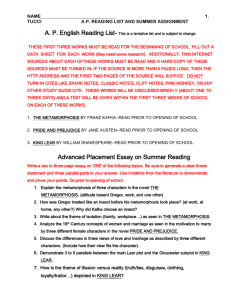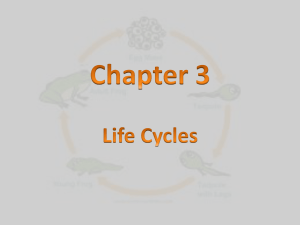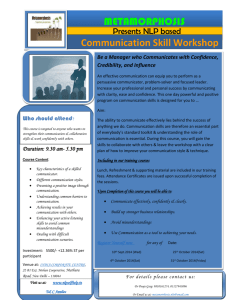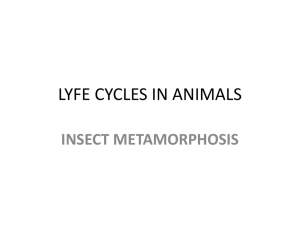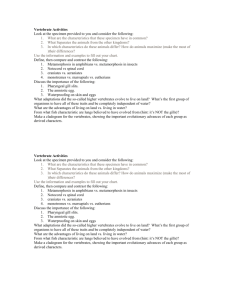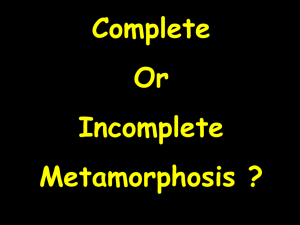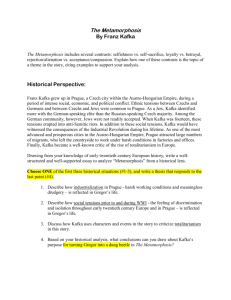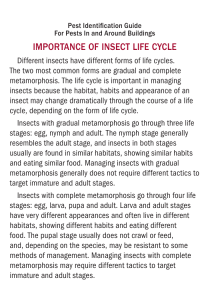English 562: Literary Criticism (Senior Seminar) Professor: E. Derek
advertisement
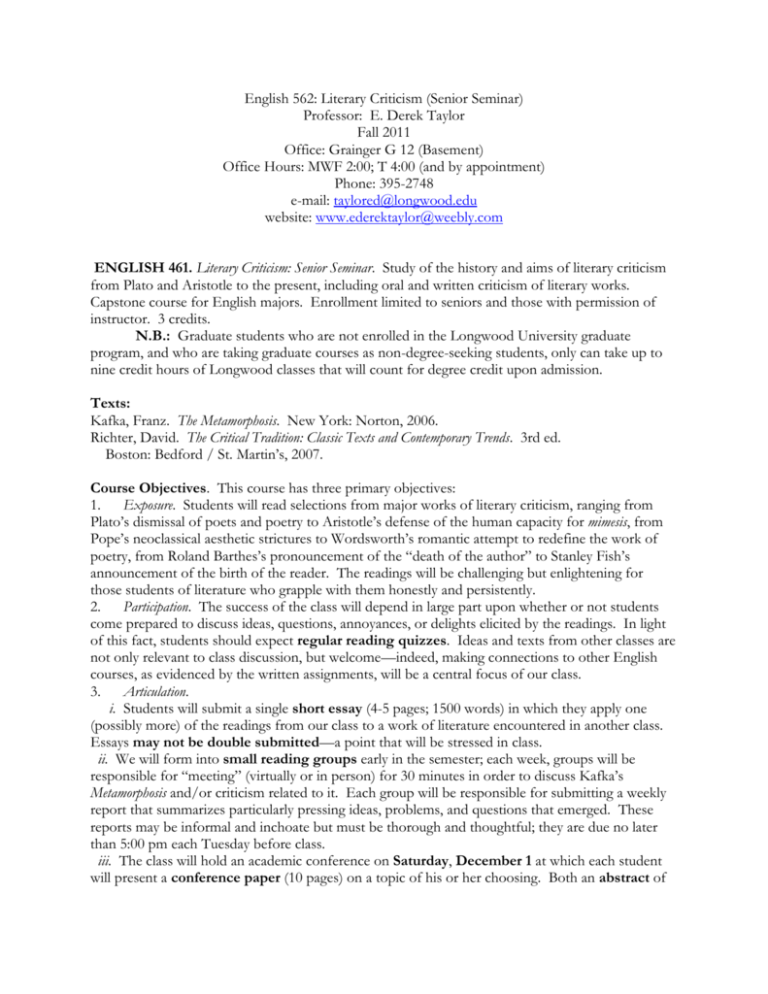
English 562: Literary Criticism (Senior Seminar) Professor: E. Derek Taylor Fall 2011 Office: Grainger G 12 (Basement) Office Hours: MWF 2:00; T 4:00 (and by appointment) Phone: 395-2748 e-mail: taylored@longwood.edu website: www.ederektaylor@weebly.com ENGLISH 461. Literary Criticism: Senior Seminar. Study of the history and aims of literary criticism from Plato and Aristotle to the present, including oral and written criticism of literary works. Capstone course for English majors. Enrollment limited to seniors and those with permission of instructor. 3 credits. N.B.: Graduate students who are not enrolled in the Longwood University graduate program, and who are taking graduate courses as non-degree-seeking students, only can take up to nine credit hours of Longwood classes that will count for degree credit upon admission. Texts: Kafka, Franz. The Metamorphosis. New York: Norton, 2006. Richter, David. The Critical Tradition: Classic Texts and Contemporary Trends. 3rd ed. Boston: Bedford / St. Martin’s, 2007. Course Objectives. This course has three primary objectives: 1. Exposure. Students will read selections from major works of literary criticism, ranging from Plato’s dismissal of poets and poetry to Aristotle’s defense of the human capacity for mimesis, from Pope’s neoclassical aesthetic strictures to Wordsworth’s romantic attempt to redefine the work of poetry, from Roland Barthes’s pronouncement of the “death of the author” to Stanley Fish’s announcement of the birth of the reader. The readings will be challenging but enlightening for those students of literature who grapple with them honestly and persistently. 2. Participation. The success of the class will depend in large part upon whether or not students come prepared to discuss ideas, questions, annoyances, or delights elicited by the readings. In light of this fact, students should expect regular reading quizzes. Ideas and texts from other classes are not only relevant to class discussion, but welcome—indeed, making connections to other English courses, as evidenced by the written assignments, will be a central focus of our class. 3. Articulation. i. Students will submit a single short essay (4-5 pages; 1500 words) in which they apply one (possibly more) of the readings from our class to a work of literature encountered in another class. Essays may not be double submitted—a point that will be stressed in class. ii. We will form into small reading groups early in the semester; each week, groups will be responsible for “meeting” (virtually or in person) for 30 minutes in order to discuss Kafka’s Metamorphosis and/or criticism related to it. Each group will be responsible for submitting a weekly report that summarizes particularly pressing ideas, problems, and questions that emerged. These reports may be informal and inchoate but must be thorough and thoughtful; they are due no later than 5:00 pm each Tuesday before class. iii. The class will hold an academic conference on Saturday, December 1 at which each student will present a conference paper (10 pages) on a topic of his or her choosing. Both an abstract of the paper and an annotated bibliography will be due before the conference. The take-home final exam will require students to be familiar with major ideas, authors, and critical movements. iv. Graduate students will be responsible for producing and submitting a comprehensive MFAT study guide that will be used by the undergraduates. Grades: Student grades will be determined according to the following model: --Short Essay: 10% --Study Guide: 10% --Reading-group: 10% --Annotated Bibliography and Abstract: 10% --Conference Paper: 30% --Out-of-class Final Exam: 20% --Quizzes: 10% --Participation: + or Attendance, Tardiness, Late Papers, Plagiarism: Students are expected to attend classes regularly. ONLY illness, official university business, and emergencies permit the make-up of work missed, and all such absences must be documented. Unexcused absences totaling 10% or more of class meetings will result in a one letter grade penalty; absences totaling 25% or more, excused or otherwise, will result in an F for the course. Late work will not be accepted in this class. Turn in papers on time, and be in class on the day of all exams. Students may not make up missed quizzes. Honor Code: All work is governed by the Longwood University Honor Code. Written work must contain the pledge in writing and be signed. Students should read closely the section on plagiarism in the Longwood Style Manual. Class Schedule: (I reserve the right to make changes to this schedule by giving oral notification in class. Absence from one class is never an excuse for being unprepared for subsequent classes.) Week 1 T. 8-21. Introduction. Week 2 T. 8-28. --Plato, From The Republic (25-38) --Aristotle, From Poetics (55-81). --Horace, The Art of Poetry (82-94) --Kafka, The Metamorphosis (1-15). Week 3 T. 9-4. --Sir Philip Sidney, An Apology for Poetry (132-159) --Alexander Pope, Part I of An Essay on Criticism (198-202) --Samuel Johnson, Rambler No. 4, Rasselas, Chapter 10, and From Preface to Shakespeare (210-230) --Kafka, The Metamorphosis (15-29). Week 4 T. 9-11. --Immanuel Kant, From Critique of Judgment (247-274) --William Wordsworth, Preface to Lyrical Ballads (304-318) --John Keats, From a Letter to Benjamin Bailey and From a Letter to George and Thomas Keats (330-333) --Raymond Williams, The Romantic Artist (364-368) --Kafka, The Metamorphosis (29-42) Week 5 T. 9-18. --Matthew Arnold, The Function of Criticism at the Present Time and From The Study of Poetry (412-434) --Friedrich Nietzsche, On Truth and Lie in an Extra-Moral Sense and From Twilight of the Idols (452-461) --T. S. Eliot, Tradition and the Individual Talent (534-541) --From The Metamorphosis, “Letters and Diaries” (61-75). Week 6 T. 9-25. --W. E. B. Du Bois, [On Double Consciousness] from The Souls of Black Folk and Criteria of Negro Art (565-574) --Karl Marx, The Alienation of Labor, Consciousness Derived from Material Conditions, and On Greek Art in its Time (397-411) --Virginia Woolf, [Shakespeare’s Sister] from A Room of One’s Own, [Austen-Brontë-Eliot] from A Room of One’s Own, and [The Androgynous Vision] from A Room of One’s Own (596-610) --Simone De Beauvoir, “Myths: Of Women in Five Authors” (635-640) --From The Metamorphosis: Iris Bruce, “Elements of Jewish Folklore in Kafka’s Metamorphosis” (107125). Week 7 T. 10-2. --Formalisms (749-763) --Cleanth Brooks, From My Credo: Formalist Criticism and Irony as a Principle of Structure (797-806) --W. K. Wimsatt and Monroe C. Beardsley, The Intentional Fallacy (810-818). --Northrop Frye, The Archetypes of Literature (691-701) --Erich Auerbach, Odysseus’ Scar (704-717). --From The Metamorphosis: Hartmut Binder, “The Metamorphosis: The Long Journey into Print” (172194). Week 8 T. 10-9. --Structuralism and Deconstruction (819-841) --Ferdinand de Saussure, From Nature of the Linguistic Sign (841-844) --Claude Lévi-Strauss, The Structural Study of Myth (860-868) --Roland Barthes, The Death of the Author (871-877) --Jacques Derrida, Structure, Sign, and Play[. . .] and Differance (914-926; 932-949) --From The Metamorphosis: Stanley Corngold, “Kafka’s The Metamorphosis: Metamorphosis of the Metaphor” (79-107). Week 9 T. 10-16. Class Canceled for Fall Break. Submit Short Essay by email by 6:00 pm. Week 10 T. 10-23. --Reader-Response Theory (962-978) --Psychoanalytic Theory and Criticism (1106-1121) --Wolfgang Iser, The Reading Process: A Phenomenological Approach (1001-1014). --Stanley Fish, How to Recognize a Poem When you See One (1022-1030) --Harold Bloom, A Meditation upon Priority (1155-1160) --Peter Brooks, Freud’s Masterplot (1161-1171) --From The Metamorphosis: Eric Santner, “Kafka’s Metamorphosis and the Writing of Abjection” (195210). Week 11 T. 10-30. --Marxist Criticism (1198-1217) --New Historicism and Cultural Studies (1320-1342) --Walter Benjamin, The Work of Art in the Age of Mechanical Reproduction (1232-1249) --Louis Althusser, From Ideology and Ideological State Apparatuses (1263-1272) --Stephen Greenblatt, Introduction to The Power of Forms in the English Renaissance (1442-1447) --Laura Kipnis, (Male) Desire and (Female) Disgust: Reading Hustler (1484-1501) --From The Metamorphosis: Mark M. Anderson, “Sliding Down the Evolutionary Ladder? Aesthetic Autonomy in The Metamorphosis” (154-172). Week 12 T. 11-6. --Feminist Literary Criticism (1503-1519) --Gender Studies and Queer Theory (1611-1627) --Sandra M. Gilbert and Susan Gubar, From Infection in the Sentence (1531-1544) --Michel Foucault, From The History of Sexuality (1627-1636) --Monique Wittig, One is Not Born a Woman (1637-1642) --Judith Halberstam, From the Introduction to Female Masculinity (1734-1752) --From The Metamorphosis: Nina Pelikan Straus, “Transforming Franz Kafka’s Metamorphosis” (126140). Week 13 T. 11-13. --Study Guide Due. --Postcolonialism and Ethnic Studies (1753-1774) --Theorizing Postmodernism (1920-1932) --Chinua Achebe, An Image of Africa (1783-1790) --Jean Baudrillard, The Precession of Simulacra (1935-1946) --Gloria Anzaldúa, “La conciencia de la mestiza: Towards a New Consciousness” (1850-1858) --Bell Hooks, Postmodern Blackness (2008-2014). --From The Metamorphosis: Kevin W. Sweeney, “Competing Theories of Identity in Kafka’s The Metamorphosis” (140-153). --Sign up for three conferences: a 10-minute “brainstorm” conference (Wednesday 11-14 or Friday 11-16) a 30-minute conferences (to be on or before Tuesday, 11-20), and a second 30-minute conference (Tuesday, 11-27). Sunday. 11-18. --Take-home Final Exam due. Email it as an attachment before 6:00 pm. Week 14 T. 11-20. Individual Conferences—no class Sunday. 11-25. Abstract due (email as an attachment by 6:00 pm). Week 15 T. 11-27. Annotated Bibliography due. Individual Conferences—no class Sat. 12-1. Senior Seminar Conference. This will be an all day affair, and your presence is required. Bring a clean draft of your paper for submission. Week 16 T. 12-4. MFAT (in our regular classroom—exam period lasts from 6:30-9:00).
